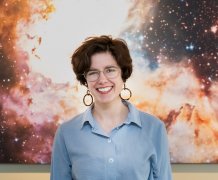articles

Jess Spake has been selected for a Heising-Simons Foundation 51 Pegasi b Fellowship.
Exeter scientist secures major international fellowship
University of Exeter scientist Jess Spake has been selected for a prestigious international fellowship, it has been announced.
Jess, a postgraduate student at Exeter’s Astrophysics department, is one of six recipients of the Heising-Simons Foundation 51 Pegasi b Fellowship.
The award provides three years of financial support for independent research, as well as mentorship and an annual summit to develop professional networks.
The fellowship - named after the first exoplanet discovered orbiting a Sun-like star - provides exceptional postdoctoral scientists with the opportunity to conduct theoretical, observational and experimental research in celestial objects both within and beyond our solar system.
Jess’s research focuses on detecting helium in exoplanet atmospheres, which introduced new possibilities to probe the atmospheres of faraway worlds.
Last year, Jess made a landmark discovery by identifying helium billowing from a distant planet’s upper atmosphere – the first successful observation of helium in a planet outside of our solar system.
The breakthrough came after the research team used specific wavelengths of infrared light to distinguish the atmospheric makeup of a planet.
This method unlocks new paths for astronomers using ground-based instruments to explore the climates of more planets in the further reaches of the universe.
In her fellowship, Jess will narrow her focus to explore what helium detection can unveil about extreme atmospheric conditions in exoplanets. Using ground-based telescopes, she will target helium in her observations to measure the rate at which exoplanets are losing their atmospheres to space.
This information will help improve the field’s understanding about the types of exoplanets that can maintain atmospheres for billions of years—possibly long enough for life to evolve.
Speaking about the award, Jess said: “One of the best moments of my life was when I realized that the strange signal in the observational data was caused by helium in the atmosphere of the exoplanet, and not its host star. That discovery was so exciting and memorable.
“The upper atmospheres of exoplanets are difficult to study, but the abundant presence of helium that can extend great distances into space makes it much easier. I’m excited for the unexpected discoveries we might make with this technique.”
The Heising-Simons Foundation is a family foundation based in Los Altos and San Francisco, California. The Foundation works with its many partners to advance sustainable solutions in climate and clean energy, enable groundbreaking research in science, enhance the education of our youngest learners, and support human rights for all people.Learn more at www.hsfoundation.org.
Learn more about the fellowship and the fellows at www.51pegasib.org.
Date: 28 March 2019
